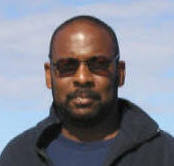 Sensational case mesmerizes Poland
Sensational case mesmerizes Poland"The perfect crime" is how the Polish media dubbed the unsolved case.
The hog-tied body was found floating in a remote inlet of the Oder River in 2000. Before death,
Dariusz Janiszewski was tortured and starved, suggesting he was killed by someone who bore him enmity.
But who would have killed the happily married, good looking, and well liked young advertising executive, an amateur guitarist who enjoyed Led Zeppelin and wore his blond hair long and flowing? Police were unable to locate any suspects, and the case went cold.
Perhaps, as in Edgar Allen Poe's
The Tell-Tale Heart, the killer could still hear the beating of the dead man's heart. Or maybe his overconfidence did him in. Maybe it was neither guilt nor overconfidence, but simply the temerity of
Jacek Wroblewski (dubbed "Jack Sparrow" by his colleagues), the new detective assigned to the cold case.
Sifting through the case file three years later, the detective decided to trace the whereabouts of the dead man's cell phone. He found that a few days after Janiszewski’s death, "ChrisB[7]" had sold the phone on an Internet auction site. ChrisB[7], as it turned out, was
Krystian Bala, a postmodernist intellectual featured in the documentary "Young Money" about Poland's nouveau capitalist class.
That link would not have been enough to convict. But Bala had written a creepy novel called "Amok" that contained startling similarities to the killing. The novel’s protagonist, a postmodernist intellectual named Chris, kills his lover and then sells the murder weapon on the Internet.
Detective Wroblewski pored over Bala's sleazy tract for clues until he had it practically memorized, even hiring a psychologist to analyze the author's personality. Further digging unearthed a direct but hidden connection between Bala and his victim: Janiszewski and Bala's wife had a brief extramarital affair some months before the murder.
Was it guilt, revelry, or a desire for attention that drove Bala to write about his crime?
Gisli Gudjonsson, the internationally known confessions expert and forensic psychologist whom I've previously
blogged about,
says it is rare for people to be able to keep a horrendous crime totally secret. People, even the most depraved, are social animals.
And Bala, by all accounts, was overconfident. Two psychologists who evaluated him after his arrest reported that he had a high IQ, extreme narcissism, and sadistic tendencies. A lethal combination for his victim and a dangerous one for him, too, in that his constant need to demonstrate his superiority led to anonymous boasts to police and the Polish media of his "perfect crime."
Bala's reported psychological makeup is similar to what psychologist
Del Paulhus likes to call the "
Dark Triad," a combination of narcissism, psychopathy, and Machiavellianism. Using rather circular reasoning, author Marilee Strong argues in her new book
Erased (which I review
here) that the triad explains a specific type of cold-blooded, premeditated wife killer, Scott Peterson being the exemplar. (
Hans Reiser, currently on trial in Oakland, is potentially another example; I plan to say more about him after the jury verdict.) I say circular, because applying the labels of narcissist, psychopath, and Machiavellian provides little in the way of explanation, nor are these theoretical constructs independent of each other.
Another way to look at these types of killings is to see them as a blending of instrumental and expressive motivations. Instrumental violence is theorized to underlie more rational, goal-oriented killings, such as the murder of a rape or a robbery victim in order to eliminate a witness, or killings that occur during warfare or organized crime disputes. Expressive violence is driven by emotion and is typically impulsive and unplanned.
Bala's motive was jealous rage, but his cunning and intelligence enabled him to harness his rage in order to plot and execute a more chilling murder. (Check out the recent San Francisco killing of
Leonard Hoskins for what could turn out to be a similar blending of instrumental and expressive violence.)

But even more essential to these types of killings than cold-blooded cunning is a chilling level of
entitlement. These types of killers, mainly relatively privileged white men, seem to believe that they have the unalienable right to permanently dispose of others who become inconvenient to them. One of the few nonwhite wife killers in Strong's book, for example, is a star football player; as catalogued in recent books on sexual violence in competitive sports, these cultural icons take entitlement to a whole higher plane.
What proved Bala's undoing was his arrogant horn tooting.
Amok,
described as "a pulp-fiction orgy of bestiality, pornographic Oedipal complexes and indiscriminate sexual violence," went on to become a star witness against him at his trial last year. Simultaneously, the book surged from obscurity to bestseller status as the Polish public lapped up every detail in the most sensational trial in the nation's history.
Although Bala was convicted of murder and sentenced to 25 years in prison, his conviction has been overturned and a retrial is expected to get underway soon.
For a lengthy essay on the Bala case, see David Grann's "Letter from Poland" in the New Yorker. News coverage is here and here; literary commentary is here. BBC has an interesting article here on cases of voluntary confession. Photo credit: valobstruction's "SUV parked in a loading zone" (Creative Commons license).
Innocent people do not confess. Especially to rape and murder.
 Or, for true crime, fiction, or other recent books, here are a few of my most recent reviews on Amazon. As always, please help boost my reviewer rank -- and let me know that you are reading my stuff -- by clicking on "yes" if you find a review helpful:
Or, for true crime, fiction, or other recent books, here are a few of my most recent reviews on Amazon. As always, please help boost my reviewer rank -- and let me know that you are reading my stuff -- by clicking on "yes" if you find a review helpful:




























